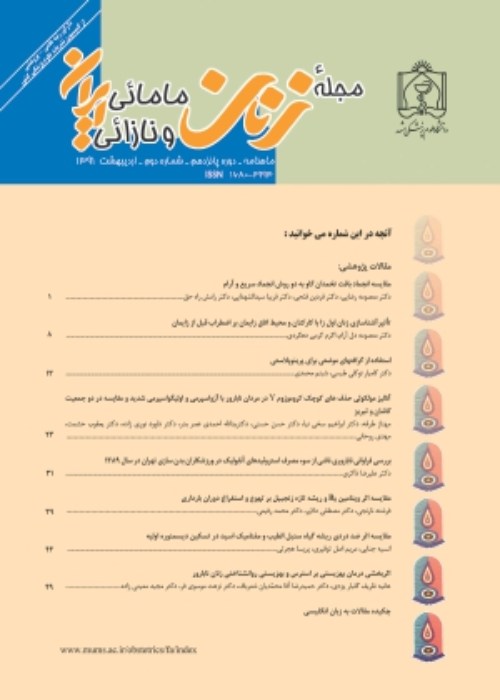Explaining facilitators and barriers to treatment-seeking in women with pelvic organ prolapse: A qualitative study
Author(s):
Article Type:
Research/Original Article (دارای رتبه معتبر)
Abstract:
Introduction
Treatment seeking in pelvic organ prolapse is influenced by socio-cultural components. Studies show that in the field of urinary-genital diseases, women are less likely to seek treatment and self-care behaviors. This study was performed with aim to explain the facilitators and barriers to treatment seeking in women with pelvic organ prolapse (POP).
Methods
This qualitative study was conducted on 15 women with POP referring to gynecologic clinics of Ghaem and Imam Reza Hospital in Mashhad in 2018. Data collection with semi-structured deep interviews continued until data saturation was achieved. All interviews were audio-taped and accurately typed, and then data were analyzed using conventional content analysis of Greinham approach with MAXqda software.
Results
After categorizing and coding the data among total obtained themes, two main themes were extracted. Facilitators to treatment seeking has eight subcategories: understanding the support of the spouse and family, the recommendations of the health team to the treatment, understanding the exacerbation of symptoms, positive experiences of treatment in the community, believing the need for treatment at an early age, fear of future complications, hardship of religious duties and disturbing sexual intercourse.Barriers of seeking treatment have nine sub-categories including: lack of knowledge about POP, personal reluctant to referring for treatment, accessibility and affordability of treatment, negative experiences of treatment in people around them, economic-financial status, shame on speak about genital problems, factors related to children and family, lack of support and companion and occasional relative improvement of symptoms of the disease.
Conclusion
The facilitators and barriers of treatment-seeking among women with pelvic organ prolapse which are identified in this study help them to understand health needs and can be considered as an important issue for designing the effective interventional and consulting programs by planners and providers of reproductive health services.Keywords:
Language:
Persian
Published:
Iranina Journal of Obstetrics Gynecology and Infertility, Volume:22 Issue: 3, 2019
Pages:
16 to 31
magiran.com/p1995192
دانلود و مطالعه متن این مقاله با یکی از روشهای زیر امکان پذیر است:
اشتراک شخصی
با عضویت و پرداخت آنلاین حق اشتراک یکساله به مبلغ 1,390,000ريال میتوانید 70 عنوان مطلب دانلود کنید!
اشتراک سازمانی
به کتابخانه دانشگاه یا محل کار خود پیشنهاد کنید تا اشتراک سازمانی این پایگاه را برای دسترسی نامحدود همه کاربران به متن مطالب تهیه نمایند!
توجه!
- حق عضویت دریافتی صرف حمایت از نشریات عضو و نگهداری، تکمیل و توسعه مگیران میشود.
- پرداخت حق اشتراک و دانلود مقالات اجازه بازنشر آن در سایر رسانههای چاپی و دیجیتال را به کاربر نمیدهد.
دسترسی سراسری کاربران دانشگاه پیام نور!
اعضای هیئت علمی و دانشجویان دانشگاه پیام نور در سراسر کشور، در صورت ثبت نام با ایمیل دانشگاهی، تا پایان فروردین ماه 1403 به مقالات سایت دسترسی خواهند داشت!
In order to view content subscription is required
Personal subscription
Subscribe magiran.com for 70 € euros via PayPal and download 70 articles during a year.
Organization subscription
Please contact us to subscribe your university or library for unlimited access!



